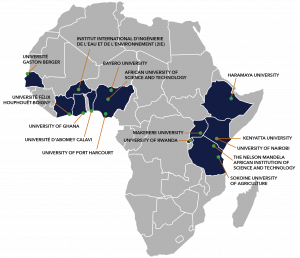Pre-Conference Message from Hon. Ezekiel Machogu, Cabinet Secretary, Ministry of Education, The Repulic of Kenya
Overview

The theme of the Rsif Conference 2024 is “Leveraging TVET in the Knowledge and Skills Ecosystem for Africa’s Industrialization”. With this theme, it is recognized that Africa, and the world at large, is looking for new ways to grow its economy, create employment for its young and rapidly growing population and generally improve living standards of its citizens, while reducing carbon emissions and conserving biodiversity. Also, the recent experience with COVID 19 pandemic, has awakened countries to the need for improved public health infrastructure and resilient supply chains. These development challenges call for nations to develop green economies but doing so requires a skilled scientific workforce, and use of science and innovation to find appropriate solutions.
African governments, through the PASET Rsif initiative are charting the path to Africa’s green economy future of work by supporting doctoral training, research, and innovation in 15 selected African host universities (AHUs) in collaboration with 29 international partner institutes (IPIs). There are currently 253 active Rsif doctoral students and 10 alumni from 24 nationalities (40% women) in sub–Saharan Africa, and 53 Rsif research and innovation projects. These students and scientists are developing skills, generating new knowledge, and developing technologies in thematic areas of climate change, renewable energy, sustainable food systems and agribusiness, digital technologies, including big data and artificial intelligence, and minerals, mining, and materials engineering. These sectors are central to Africa’s future green economy, which will require unique skills sets to adapt to the changing demands of the future of work.

Purpose
The purpose of the Rsif Conference 2024is to bring together the Rsif community, including scientists, policy makers, development partners and private sector to discuss concrete ways of enhancing the contribution of African higher education sector to Africa’s green economy future of work.
Why you should attend

The objectives of the Conference are to:
1. Identify skills sets that are needed for Africa’s green economy future of work.
2. Share scientific contributions, including case studies from Rsif doctoral training, research, and innovation activities.
3. Identify opportunities for networking and partnerships.
Expected Outcome
The expected outcome from the Conference is a shared vision of the contribution of Africa’s higher education institutions in developing a scientifically skilled workforce needed for Africa’s green economy future of work.
Conference Design
The Conference will be held for two days. The first day will start with plenary sessions in the morning and breakout sessions in the afternoon (see proposed conference structure and program below). The Conference will be an in-person event. However, plenary sessions, which include keynote talks will be live streamed, and there will be possibility for online participation in the breakout sessions. The second day in the morning will be mainly for networking and discussions of posters and exhibitions, as well as important side events. The afternoon will be reserved for the start of the 6th PASET Forum. Members of the PASET Consultative Advisory Group (CAG) will be invited to chair or moderate specific sessions of the Conference.
The plenary sessions will have a mix of scientific and policy discussions, while the breakout sessions will mostly be for scientific presentations. Poster and product exhibitions will be made throughout the conference, but mostly on day two of the conference and available only to in person participants. Language interpretation services (English, French and Portuguese) will be provided in the plenary sessions. Conference proceedings containing scientific papers presented will be prepared, peer reviewed and published.
Side events, and possibly an Rsif breakfast meeting with potential funding partners will be organised. The PASET CAG meeting will also be organised as a side event.
Depending on event location, a field visit to Rsif current partners might be organised for EB and CAG members.
Target Participants
The target participants for the Conference include vice chancellors, faculty, and students of Rsif AHUs, IPI faculty and representatives, development partners, ministries responsible for higher education in PASET and Rsif contributing countries, policy makers, private sector, and other key stakeholders working on Africa’s green economy agenda.
Organizing Committees
- Main Conference Organizing Committee
The Rsif RCU staff at icipe together with the PASET Secretariat staff at the Ministry of Education, Rwanda will constitute a conference organizing committee. The CAG and EB will be represented on the Organizing Committee.
- Scientific and Publications Sub Committee
A call for abstracts/papers will be made targeting Rsif scholars, researchers, and faculty, and this subcommittee will be responsible for reviewing papers and posters submitted and selecting the ones to be presented at the various conference sessions. The exception will be invited keynote and related presentations. Members of the subcommittee will comprise Rsif RCU staff, a CAG representative, AHU and IPI representatives. Members of the Rsif Grants Independent Technical Committee (GITC) may also be co-opted to the subcommittee.

